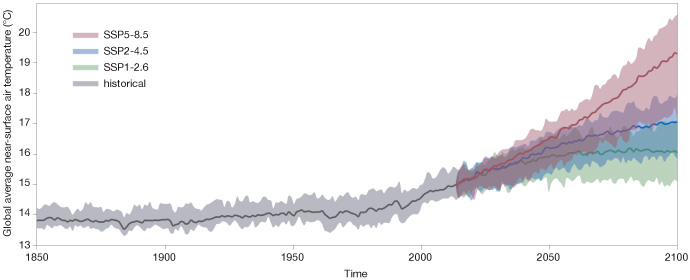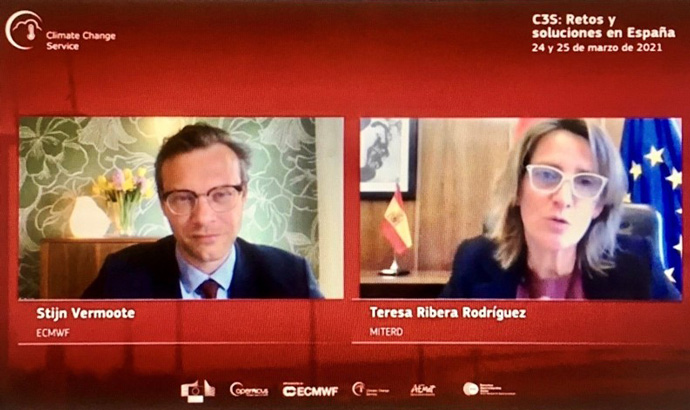

Image: imacoconut/iStock/Thinkstock
The Copernicus Climate Change Service (C3S) has recently made available the world’s latest climate projection data, CMIP6, which will underpin the next IPCC Assessment Report. C3S, which is operated by ECMWF and is part of the ground-breaking EU Copernicus Programme, has also run a Challenges and Solutions in Spain event, in conjunction with AEMET and the Barcelona Supercomputing Center (BSC), which brought together different types of users of such data.
The full CMIP6 dataset is archived at the Earth System Grid Federation (ESGF). A quality-controlled subset of the data – which will be expanded in the future – has been published in the C3S Climate Data Store (CDS) through an infrastructure set up to improve the ease and reliability of access to the data. The release is timely given such projections play a key role in climate-related decision-making, notably for many of the audience members of the C3S event.
Now in its sixth phase (CMIP6), CMIP involves a large number of academic and operational institutions around the world running their climate models with a common set of input parameters and sharing the output. CMIP makes the resulting multi-model output dataset available not only for further climate model development, but also for analysis and application in a variety of impact studies.

An illustration based on CMIP6 data available in the CDS, showing global mean temperature between 1850 and 2100 for selected CMIP6 models. The grey shaded area shows the range of historical simulations and the coloured areas show potential future temperature change based on different greenhouse gas emission scenarios (red is pessimistic, blue is realistic and green is optimistic). Credit: Copernicus Climate Change Service, ECMWF.
Data-driven solutions
Held on 24 and 25 March, the C3S Challenges and Solutions event was the first of its kind and scale for C3S, AEMET and BSC, with over 600 registered participants. The partners targeted decision-makers, across business and policy, to engage in the challenges of climate extremes and data-driven solutions for the water and energy sectors in Spain.
“A key objective of the Copernicus Programme, as set up by the European Union, is to support decision-makers at international, national and local levels with quality-assured data,” said Stijn Vermoote, Head of User Engagement for Copernicus Services at ECMWF.
“This type of joint event, relying on the close partnership between ECMWF and its Member States – in this instance, Spain – is a great opportunity to raise awareness of not only the challenges, but also the data-driven solutions available to decision-makers. Attendees included data specialists as well as representatives from multiple economic sectors and local, regional and national policy-makers.”
The online event was a good illustration of how seriously Spain takes the climate change challenges. With two Ministers of the Spanish Government (Teresa Ribera Rodríguez – Vice-President and Minister for Ecological Transition and Demographic Challenge; and Pedro Duque Duque – Minister for Science and Innovation) as well as the Mayors of Barcelona and Valencia (Ada Colau Ballano and Joan Ribó Canut, respectively), the critical nature of the services available was made extremely clear.

Teresa Ribera Rodríguez (right), Vice-President and Minister for Ecological Transition and Demographic Challenge in the Spanish Government, addressed attendees at the opening of the C3S Challenges and Solutions in Spain event.
As an event designed specifically for and in collaboration with Spain, the sessions were run in Spanish with simultaneous translations, and showcased C3S, its partners and Spanish businesses already making use of climate data to innovate and grow.
Vortex and Lobelia, two Spanish companies already using C3S data, presented their experiences, products and services. They also joined ECMWF’s Stijn Vermoote and Swiss explorer and environmentalist Bertrand Piccard in a live Euronews social media broadcast on climate entrepreneurs, taking the message to a pan-European audience.
The afternoon of the second day was dedicated to exchanging ideas with participants to help inform the development of C3S in the next phase of the Copernicus programme after 2021.
Further information
C3S, implemented by ECMWF on behalf of the European Commission, freely and openly provides authoritative information about the past, present and future climate, as well as tools to enable climate change mitigation and adaptation strategies by policy-makers and businesses. There is more information about the Service and case studies of its users on the Copernicus Climate Change Service website.
